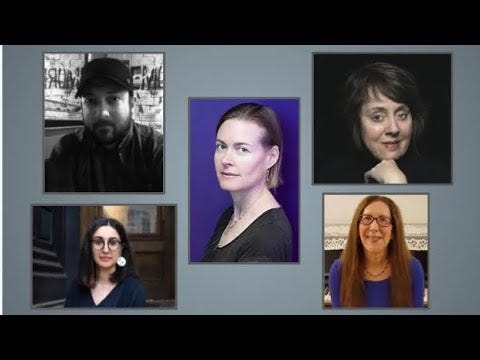"Read More, Write More, Translate More." A Chat With D.P. Snyder, Nancy Naomi Carlson, Parisa Saranj, Sacha Idell & Samantha Schnee
“No one’s heard these people.”
Ahoy, friends! I come with news of another interview, freshly wrapped.
Earlier this week I had the privilege of speaking with four editors and one writer on the subject of translation. Truth be told, I know very little about translation. I found our conversation both fascinating and inspiring.
About the panelists: D.P. Snyder is a writer, translator, member of the American Literary Translators Association (ALTA), and Board Member of Editors at Reading in Translation and on the Translation Committee of PEN America. Nancy Naomi Carlson is a poet, translator and Translations Editor at On the Seawall. Parisa Saranj is a writer, translator and Translations Editor at Consequence Forum. Sacha Idell is a writer, translator and Editor at The Southern Review. Samantha Schnee is a writer, translator and Founding Editor of Words Without Borders.
The first question I had was, why do it? Why go to the trouble of translating works from other languages and cultures?
The answer might seem obvious—to bring these works to new audiences, of course. But many translators are writers in their own right. Surely they must feel a tension between wanting to spend time on the words of others versus time on one’s own projects. Why go to so much effort to bring to light the words of other people?
Their answers provided insight into the rich field of translation and how vital such endeavors are. Translators, they explained, are “mission-driven” and often possess “an insane work-ethic.” Being a translator “puts you in dialogue with the writer and all the choices writers make.” It’s a form of “literary apprenticeship.” Translation is “exciting;” “an alchemy;” and “a responsibility.” “No one’s heard these people.”
The panelists so eloquently communicated the importance of translating literary works, and spoke with such evident love for their projects, that I then wondered how much experience was required for these undertakings. Could I try my hand at translation, with my rusty Spanish and loose French comprehension? How conversant must one be in the native language? Could the blunt instruments of near-fluency be enough?
Apparently, there is much debate around these very ideas in the world of translation. We discussed issues of fluency in a language, as well as fluency in comprehension of a culture. In order to translate successfully, it is, after all, not just words one needs to interpret, but meaning and intention, which are typically derived from the norms and values within a population. Translators do so much more than translate one word to another—they read contexts, consider audiences, bridge gaps between entire worlds of people.
Overall, it was an immensely interesting conversation. And a practical one! If you are interested in starting out as a translator or going deeper into your work, and/or if you’d like to build community among other translators, the panelists had many great suggestions. The editors also spoke about how to submit translations at their particular magazines, and also shared resources that list ongoing calls for translations.
This discussion will likely be of interest to editors as well, as they had solid advice for lit mag editors who are genuinely interested in publishing and soliciting more translated works for their magazines.
The hour flew by, and we barely scratched the surface of this rich and complicated topic. I hope you all enjoy this conversation as much as I did.
To all who came out to participate, thanks for tuning in!
And, of course, a huge thank you to D.P., Nancy, Parisa, Sacha and Samantha for taking the time to shed light on such an important subject.
This one is for paying subscribers only. Signing up will also give you access to future exclusive content as well as lit mag chats, study halls, journal discounts and more. Your support is appreciated.
Happy viewing!



